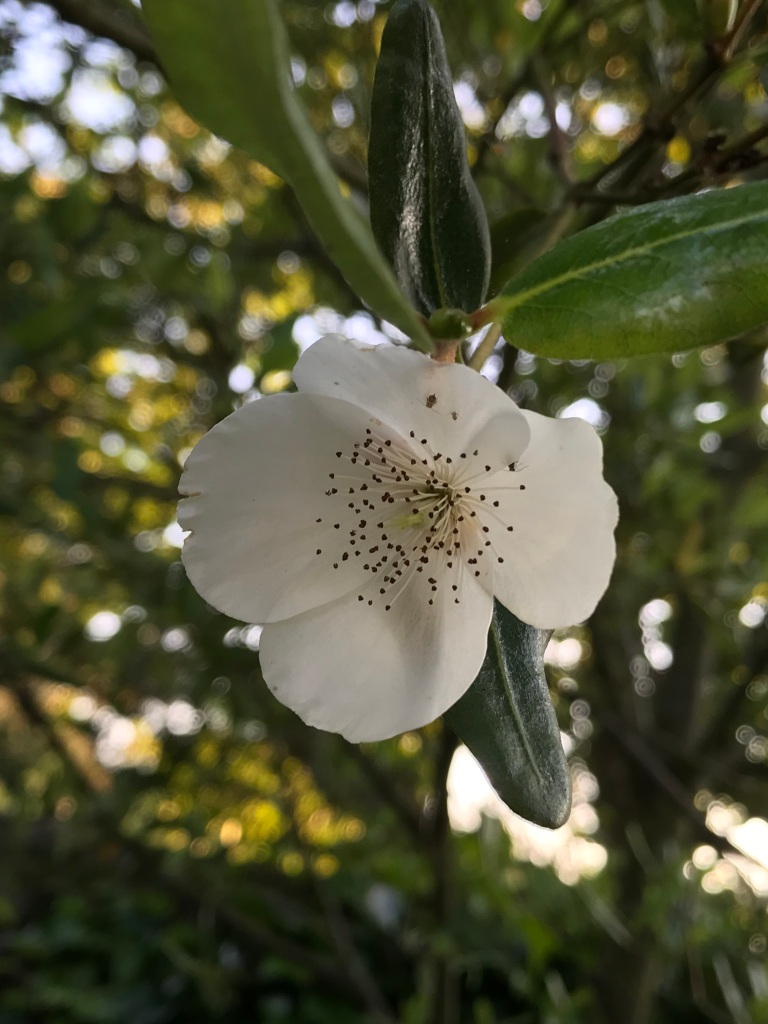
For the first 20 years of my city existence I lived in flats. The last one was a ‘double upper’ on the 6th and 7th floors of a towering New Town tenement. From its windows the islands in the Firth of Forth were visible. At night, you could see the lighthouses blink if you looked up from your plate at dinner. None of those flats had access to a private outdoor space. I hadn’t really noticed this deficit until, expecting our first child, we moved to a house with a garden. Suddenly there was terroir to manage. A terraced town house is, by its nature, a tall thin thing and the back garden was similarly narrow: the width of the house and about 40 yards long. The previous owners were artists and keen gardeners who had divided the elongated space into ‘rooms’ and crammed it with interesting plants. The trees and shrubs had grown so tall the various rooms afforded almost complete privacy. From the most distant section you couldn’t even see the back of the house. We flitted in October just as everything was dying back but I was thrilled to open the back door, day or night, and enter a private realm. What lay dormant beneath the ground was a mystery yet to unfold.
I was brought up in the Ayrshire countryside and worked on the family farm during school and university holidays. We had a large garden lying a sobering 600 feet above sea-level, but the weather in the west is mild. Mostly. There were two lawns, many mature trees, a pond, formal bedding, fruit bushes, vegetables, cold frames, a potting shed and three greenhouses. One of my father’s enterprises was a hotel in town and the garden looked nice enough to use as a backdrop for wedding photos before the couples attended their reception at the Royal Hotel.
Ayrshire farms were once notable for their ash and willow trees but there have been casualties even before the current horror of ash die-back. We had a huge ash towering over the gates to the drive and another one near the top of the garden close to the stack yard. It became senile and dangerous and so was reduced to a massive trunk about 15 feet high. Our engineer, whose garage was opposite the felled tree, remarked that there was now ‘a hole in the sky’. We topped the amputated bole with an old door which we nailed down to create an observation platform. Camouflaging water-sprouts grew up around it and we improvised a rope ladder with pieces of kindling and baler twine. An overgrown shrubbery around the base of the tree was our cowboy ‘hideout’.
My father loved gardening but most of his time was taken up by his business interests and public work, so he employed a full-time gardener. Dad retained an interest in his tomatoes, dahlias and chrysanthemums which he raised in the greenhouses. An elder of the Kirk, he supplied the church with a flower arrangement every Sunday and corn sheaves at harvest thanksgiving.

Apart from annual hay-making in summer, I laboured in the dairy on the bottling and cartoning machines, drove a milk tanker, delivered milk and did a bit of garden maintenance on the side. We had a green ATCO 14-inch cylinder lawnmower. It had a two-stroke petrol engine with an accelerator lever on the right side of the handlebars and a clutch on the left. You revved it up, engaged the clutch, and the mower lurched off, leaving the classic stripes in its wake. The longer grass stalks survived the ATCO and after mowing I crawled about obsessionally, cheek to the ground, cutting them off with shears. Aesthetic and strategic control remained with my father and the gardener. Every year, in early summer, the borders around the lawns were planted out with bright red and yellow begonias and grey echeverias with orange flowers. These tender souls spent the winter sheltering on trays in the potting shed. The larger flowerbeds near the house were planted with antirrhinums (snapdragons).
My father had a vision for the garden as a place of casual but controlled elegance. For a while he employed one of our retired tractor men as gardener. I was very fond of Willie who could be hilariously funny. He loved gardens, but mainly as a means to grow prize vegetables. We held an annual staff horticultural show in the lorry garage which we children were allowed to enter using random stuff from the garden. None of it had a chance of winning against dedicated competitors like Willie. He had a strongly developed sense of order. He would chop off any herbaceous plants that strayed onto the the paths or lop low-hanging cherry branches if he saw that they were clipping the car aerials on the way up the drive. As my father surveyed the latest scene of devastation, Willie would declare, ‘That’s it a’ square’t up again, Mr John.’*
The fruit and vegetable parts of the garden supplied the house in the traditional fashion. All summer we pillaged the strawberries, raspberries, gooseberries and peas. Appropriately the strawberries were bedded on straw and netted against avian depredations. We crawled about under the nets to pick the strawberries – which was delightful as long as you didn’t kneel on a slug. My mother said we should whistle while we worked to stop us eating the berries. We always had fresh salad and new potatoes with our summer meals. Mum made pies from the gooseberries, rhubarb and blackcurrants; the crusts supported by a variety of ceramic flues in the shape of blackbirds or elephants.
It is never a good idea to start digging up a garden before you know what’s there. Each fresh season in our new home brought unexpected delights as things emerged from the ground or drab shrubs unexpectedly burst into bloom. I was never all that keen on herbaceous borders, preferring the simplicity of shrubs and grass. Inevitably some plants will hold less appeal than others. I don’t much like hydrangeas or forsythia. A garden also needs refereeing on a regular basis to stop the bullies taking over. Some decisions were taken for us as elderly or weak trees came down in storms or subjects succumbed to disease. A garden is not like furniture. Everything in it either grows or dies. Only the Japanese seem able to maintain a permanent structure. The loss of a tree or plant should always be regarded as an opportunity to introduce something new – or simply let in more light for the survivors. In the end, I began removing things to avoid presiding over a Scottish version of The Lost Gardens of Heligan.
A garden offers respite from the pressing issues of life, simplifying matters to a choice of plants, physical toil and the changing seasons. I particularly liked strenuous landscaping projects both for the beneficial exercise involved and the eventual satisfaction. These tasks afford the same release as playing sport, freeing you for a while from life’s bewildering options by imposing a simpler set of rules. Like Peter Sellers’ character Chance the gardener in Being There, I imagined myself ruling a mini empire and making Delphic pronouncements to friends about herbaceous perennials or formative pruning. My wife’s mother didn’t share my new enthusiasm. I once complemented her on her own neat garden to which she smiled wearily and said, “I just see a lot of work.”
I suppose it is a lot of work, additional unavoidable chores for the weary homeowner, but a day spent working in the garden is a pleasure to me. Regular injuries are however inevitable. I don’t venture outside thinking, ‘Today I will probably get hurt,’ but I am not put off by the prospect. The tariff of danger varies with the gravity of the task, from tree-felling to a spot of light dead-heading. I have occasionally worked on trees on the boundary of the garden with rusty spiked railings lurking below. I have imagined the casualty admission note, ‘This 65 year old retired radiologist was attempting to…’
Plants teach you a kind of delayed gratification akin to agricultural sowing and harvesting. Like very slow fireworks, you stick them in the ground and retire for 12 months – or 24 months – or, in the case of my Tasmanian Leatherwood, 10 years. Leatherwoods are famous for the delicate flowers that appear in late summer and high-value honey.

I bought mine as a small sapling in the shop at Edinburgh’s Royal Botanic Gardens after admiring a splendid columnar specimen in full flower next to Inverleith House. As the years went by, my purchase grew painfully slowly and remained bereft of blooms. After a decade of disappointment, I stood before the the scrawny specimen, my hand hovering over the bow saw, when I noticed a single perfect flower. The next year there were more and now it is covered in blossom and attendant bees every summer.
One of the trees I took out with a very heavy heart was a russet apple. Although russet apples are hard and dry (and do the russet thing of going brown the instant they are cut open) they are sweet and stew well. We had fun weaning both our children on home-grown apple purée. But this russet was right in front of the proposed site of a new summer house. After seeing a lovely American crab apple, Malus dartmouth, in the Botanics, I ordered one online to compensate for the sacrificed tree. It arrived at my work from a nursery in Yorkshire, bare-rooted, 7 feet long and furled in black plastic. I lowered the roof of my car, stuck the long unwieldy parcel between the passenger seat and the transmission tunnel and with the top end protruding backwards, set off for home. A colleague saw me en route and asked me where I was planning to drop anchor. I planted the tree in the lawn and staked it low down for two years. It took well and it is a mass of blossom in the spring. If not picked for cooking, red and orange apples the size of table tennis balls hang on into the winter months like Christmas decorations.
In the end gardens are transient things that depend on an individual or group having the energy and determination to create something out of the incessant flow of nature. Gardens reward the gardener and give pleasure to others but neglect rapidly leads to decline and an overgrown garden is a poignant sight. To some, gardening will always be a dreary chore. Whenever I get overenthusiastic about its charms someone will say, ‘Well if you like it that much, you can come and do my garden.’ To which I always reply, ‘What would be the point of that?’
*My father was initially in partnership with his two brothers and since they shared a surname it was necessary to differentiate between them by calling them Mr John, Mr Willie and Mr James.
